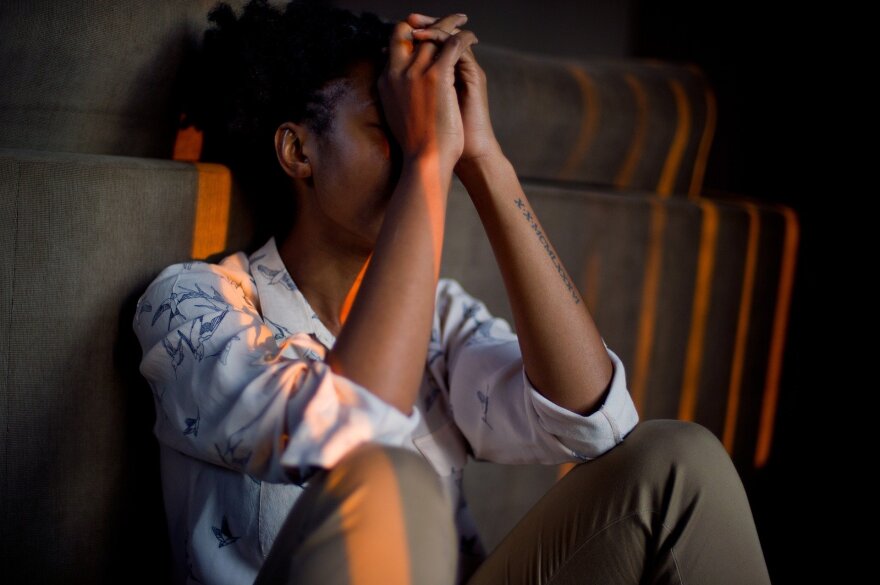The mental health threat posed by the coronavirus is gaining attention. A new study by the Lancet shows 25 percent of British citizens reporting mental distress due to COVID-19. That trend is reflected here in Alabama by a report by the internet website Wallethub. Their survey puts Birmingham, Montgomery, and Mobile near the top among U.S. cities for stress related to the coronavirus. The pandemic appears to be affecting the physical, economic and psychological well-being in Mobile.
Every Tuesday morning, cars fill the parking lot of Prodisee Pantry in Spanish Fort. Volunteers in masks bring out shopping carts filled with needed food to residents who can’t afford a trip to the grocery store. Since March, requests for help to this charity near Mobile have skyrocketed.
“Prodisee Pantry has provided a year’s worth of food since the pandemic broke out. That equates to almost 600 tons of groceries,” Executive Director Deann Servos said. “That’s 140 tons more than we did last year.”
Servos has been at Prodisee Pantry for 17 years. In that time, the nonprofit has helped victims of hurricanes, the 2010 oil spill, recessions and other disasters. The pandemic is like nothing anyone has seen before. Many people pulling into the Prodisee parking lot have never had to ask for help before.
“This is an unknown, uncertain disaster,” she said. “Something we haven’t faced in our lifetime. When the pandemic broke out, more than thirty percent of the families who came for food resources had never sought help for groceries from Prodisee Pantry in our 17-year history.”

Prodisee Pantry is also an underwriter of Alabama Public Radio.
After a hurricane or other disaster, people can turn to family, church, friends or neighbors. Servos says many people are now cut off from those basic supports.
“Our families are stressed,” Servos said. “When they come to us for the most simple of things, food. We all have to eat. We realize that something else is going on. COVID is impacting them emotionally, spiritually. We are social creatures and when families struggle, they turn to church. They turn to family and right now, we’re asked to stay distant from our support network.”

In addition to providing food, volunteers also try to connect people with other forms of help. That includes mental health counseling. Servos said that’s something more residents seem to need now.
"We diligently try to boost them up and get them plugged into mental health resources, counseling or other services that may benefit themselves and their families,” Servos said. “We don’t want COVID to become a child abuse excuse, a domestic abuse excuse, a lapse in mental health counseling. We want to make sure families that are coming for food are also plugged into those resources that they desperately need."
Requests for mental health assistance are also on the rise in the bay area.
“A lot of the callers are pretty much calling about the anxiety and the stress that’s coming from the uncertainty of all that COVID is bringing,” said Japonica Bryant, who helps connect residents with mental health care for AltaPointe Health Systems in Mobile.
Bryant said uncertainty is also contributing to stress.
“Right now, just not knowing what’s about to happen,” she said. “A lot more of them are calling because they’re depressed...I’m sure it’s coming from social isolation from being afraid to go out and then not being able to come out because of pre-existing conditions and things of that sort.”
Many AltaPointe callers are also experiencing new levels of stress and don’t know what to do. Others are nervous about going out to seek treatment during the pandemic.
“I believe that a number of the increase in calls are people that are new who are just looking into Alta Pointe because of the uncoming anxiety and depression and stress that that they’re experiencing now but also those who are concerned about how they’re going to continue their treatment or therapy when they can’t come to the office,” Bryant said.
Many people are more physically isolated right now, but Bryant says they can still find ways to deal with stress.

“Also, I have encouraged people to just make sure we’re practicing self-care for ourselves, even the simplest things like going outside,” Bryant said. “You can’t go hang out with your friends and all that, but you can take a walk. You can call people, Facetime or Zoom. There’s so many other things we can do to make sure we’re not falling into the pit of depression and things to alleviate that.”
Many people are looking beyond self-care and seeking medications for help.
“One of our specialists our callers are experience anxiety and are asking for medications to combat that, so I guess our consumers who are not taking medications for things like their anxiety or such like that, they are now asking for those things,” Bryant said. "More and more Mobile area residents experiencing problems are trying to self-medicate with alcohol or drugs to relieve stress.”
“We are seeing a tremendous increase in the number of families calling for help about loved ones,” said Virginia Guy, director of the Drug Education Council in Mobile. “People who were drinking maybe socially have started drinking a little bit more. We’re seeing a lot of people drinking their way through the stress of this pandemics, so it’s very alarming to us, the mental health and addiction issues that are having in the middle of this health crisis.”

Guy said one national study showed that deaths from drug and alcohol abuse, including suicides, increased 40 percent from February to April 2019.
“We’re seeing just huge numbers of people that had maybe minimal problems going into this, but then just the stress of the pandemic kind of pushed them over the edge so we’re seeing a lot more of the alcohol related issues, drug related issues and, of course, suicides,” Guy said.
Guy said mental health effects of fear and isolation could be with us long after a vaccine is found for the coronavirus.
“We started out, it was a healthcare crisis. It quickly became an economic crisis. I think one of the most difficult things we’re going to have coming out of this is the mental health and addiction crisis that’s left behind because there are a lot of people that are being totally affected by this almost in a PTSD kind of way. We’re seeing relapses with people in recovery because of the isolation. We’re seeing people who were maybe drinking socially, but kind of heavy socially, all of the sudden kind of tip the scales into harmful or addictive type drinking. It certainly has changed everything, but I don’t want to be completely negative because there also is a tremendous amount of help available too,” Guy said.
Some treatment programs are going online, while some are adapting to social distancing.
“There’s 12-step meetings that are virtual,” Guy said. “There are 12-step programs that are now meeting again in person. There for a while, almost all of them had completely gone to virtual. There’s some that I know of that are meeting, but they’re meeting maybe early in the morning outdoors in lawn chairs where they can stay distanced. Everybody’s bringing their own coffee so they’re not drinking out of a common coffee pot.”
While the coronavirus has increased stress in communities across, Alabama, volunteers and social service agencies are working to join together to help their fellow residents get through the pandemic.
“COVID-19 has added stress to families that were already struggling,” Servos said. “It’s just another layer that we need to address and nonprofits from counseling services to groceries to budget counseling, all of these are important components to making our community stronger.”
An Alabama Public Radio news feature, which is part of APR effort to address the "news desert" along the state's Gulf coast. APR recruited and trained veteran print journalists in Mobile and Baldwin counties to join our news team to do radio stories from along the Gulf coast.



